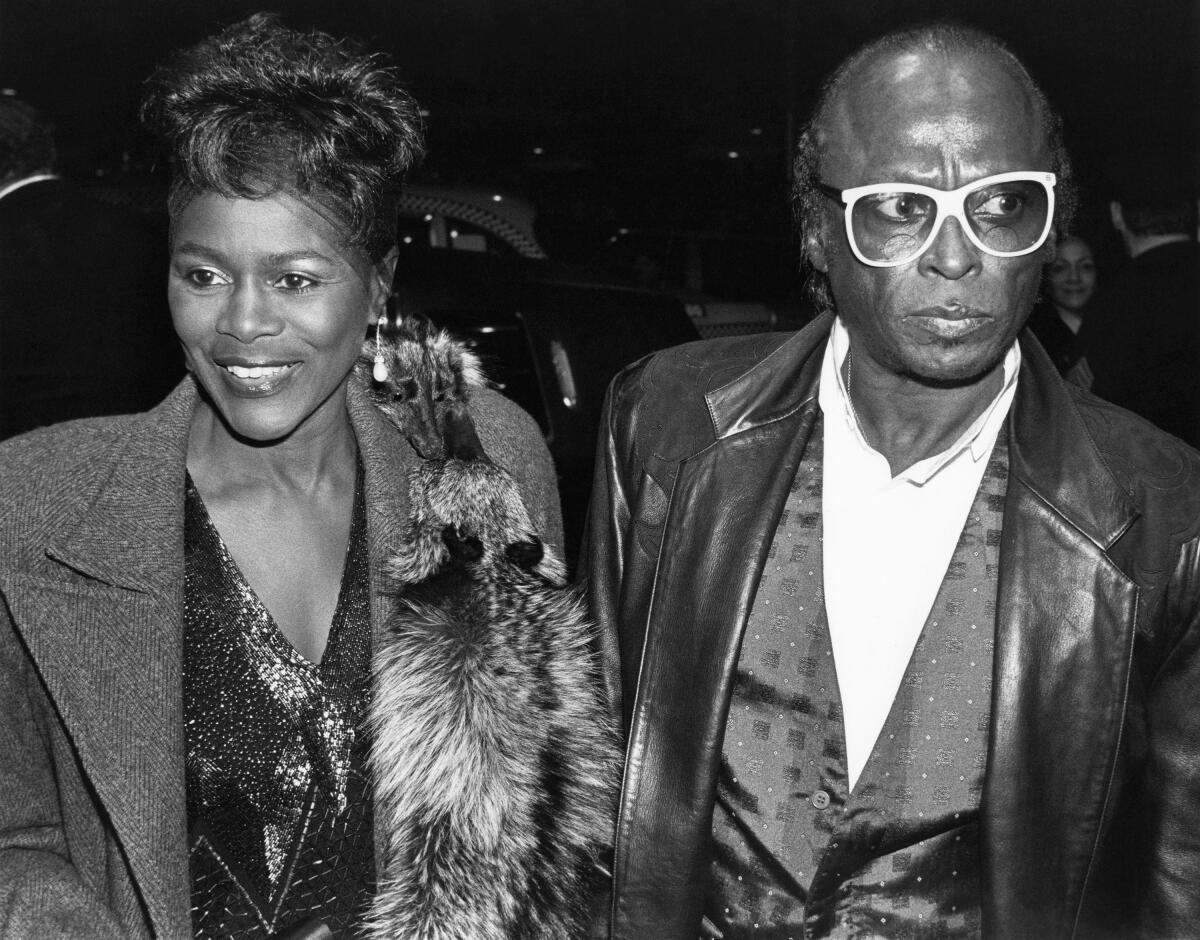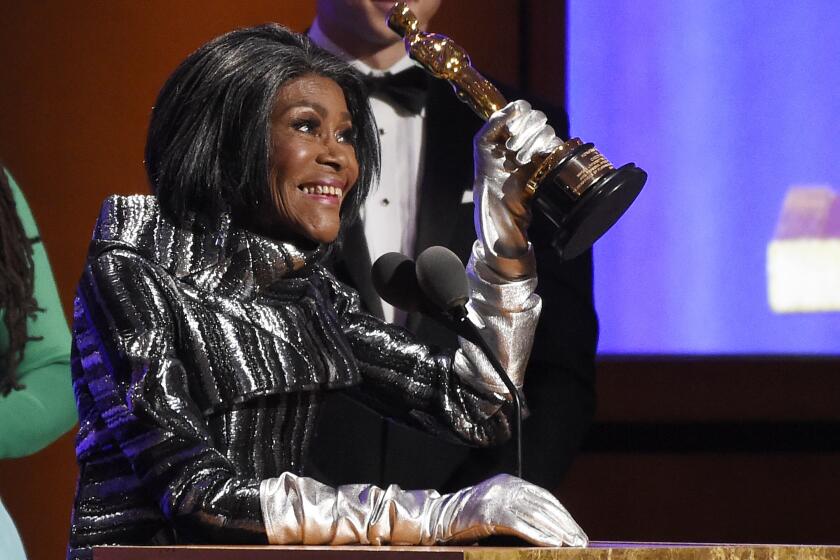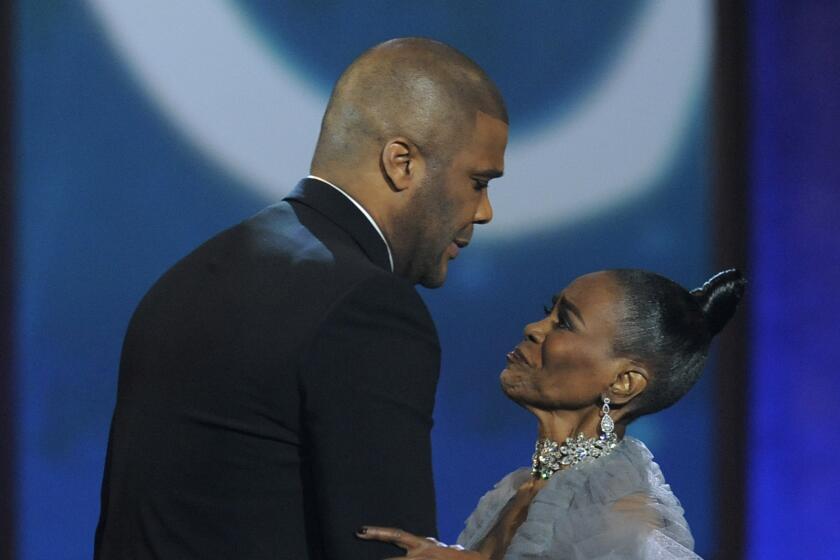The tortured, touching love saga of Cicely Tyson and Miles Davis
Starting in the mid-1960s, Cicely Tyson had a decades-long, on-again, off-again romance with trumpeter Miles Davis that peaked with their 1981 marriage and ended in a 1989 divorce.
Behind the scenes it was a turbulent relationship, according to both, but during their time in the spotlight, they were one of the most striking, stylish couples in America: she an Oscar-nominated, barrier-breaking dramatic actress and movie star known for an unwavering dedication to her craft; he a revered, charismatic jazz musician and innovator with an addictive personality and a bad reputation.
“Miles and I were among a handful of Black power couples of the sixties, an artistic duo that drew stares,” wrote Tyson, who died last week at age 96, in “Just As I Am,” her just-published autobiography. “I felt proud to stand alongside Miles, loved folding my silk-gloved hands into his strong ones.”
Tyson’s career spanned seven decades with works such as “Sounder” and “The Autobiography of Miss Jane Pittman.”
One measure of their fame? The Tyson/Davis nuptials were held at then-high-flying comedian Bill Cosby’s house and officiated by then-Atlanta mayor Andrew Young.
It’s a relationship that both Tyson and Davis, who died of organ failure in 1991, extensively addressed in their respective autobiographies and the dueling narratives collide in some serious drama. Driven by equal parts tenderness and fury, their story is marked by Davis’ expansive mid-period soul-jazz experiments and Tyson’s rise as one of the most acclaimed Black actresses of her generation.
Tyson writes of first seeing Davis perform years earlier and being immediately taken with his presence: “There he was onstage, short ‘fro, sculpted cheekbones, skin so velvety dark that it almost looked unreal. And boy was he sharp: Brooks Brothers blazer, coolness personified.” She later describes him as “a shiny penny, Black as me and then some.”
Their relationship started in New York in 1966 after they ran into each other a few times near Riverside Park in the Upper West Side. Both were living in the neighborhood. Davis, then separated from his first wife, had seen Tyson on the TV show “East Side/West Side” and was smitten, he wrote in “The Autobiography of Miles Davis,” his vindictive, riveting 1989 book co-written with Quincy Troupe.
“[S]he wore her hair in an Afro and she was always intelligent when I saw her. I remember wondering what she was like,” Davis wrote. “She had a different kind of beauty that you didn’t usually see in black women on television; she was very proud-looking and had a kind of inner-burning fire that was interesting.”
He fell hard for her. The trumpeter — whose very livelihood depended on healthy lungs — offered one measure of his feelings for Tyson early in their romance: “She told me she didn’t like kissing me with all that cigarette smell on my breath. She said she would stop kissing me if I didn’t stop, so I did.”

Miles Davis, “Star on Cicely”
Tyson, who was two years his senior, writes that their conversations “rippled with honesty, with depth of understanding. There is a love that gently guides your palm toward the small of another’s back, a care that leads you to ensure no harm ever comes to that person. From the beginning, that is the love I had for Miles. That is the soft place where our connection rested its head.”
Within a year of their meeting, Davis featured a closeup of Tyson for the cover of “Sorcerer,” his transitional 1967 album of soulful post-bop. “[E]verybody who didn’t already know it knew then that we were a twosome,” he wrote. The reserved Davis admitted that he was unsure of the romance at first, but that “Cicely is that type of woman who just gets into you, gets inside your blood and your head.”
Their first attempt at love didn’t last long. By 1968, the philandering Davis was featuring his new amour, Betty Mabry (who, as Betty Davis, released a series of ferocious soul-rock albums), on the cover of his album “Filles de Kilimanjaro.” He and Mabry married that same year. They divorced in 1969, Mabry has said, “because of his violent temper.”
Tyson soared through the 1970s without Davis, starring in TV and film productions including “Sounder,” “The Autobiography of Miss Jane Pittman” and “Roots.” As she did, Davis created some of his most out-there jazz-funk records, including “Bitches Brew,” “Live Evil” and “Get Up with It” — while doing mountains of cocaine and devolving into a troubled recluse who couldn’t retain a housekeeper, let alone a girlfriend.
Tyson spent more than 60 years using her platform not only to garner awards but to challenge stereotypes about what it means to be a Black woman in America.
Tyson was well aware of the trumpeter’s ill health during their time apart, Davis wrote, due to “this real tight spiritual thing” they had going. “She kind of knows when I’m not doing too well, when I’m sick and sh—.”
Tyson’s take? “I’d always get this gnawing feeling in my gut when Miles was in deep trouble.”
Reconciling with Davis by the end of the decade, she devoted her energy to his recovery, Davis wrote, adding that Tyson “protected me and started seeing that I ate the right things, and didn’t drink as much. She helped get me off cocaine.” He added: “All of a sudden I started thinking clearer, and that’s when I really started thinking about music again.”
He issued his first studio album in six years, “The Man with the Horn,” in 1981, and followed that in 1983 with “Star People,” a beat-driven fusion album. Though Davis never explicitly cited Tyson as a musical muse, the final composition, “Star on Cicely,” was named for his wife.

The couple’s connection confused many in Tyson’s world. While considered a renegade artist, Davis’ addictions weren’t much of a secret and Tyson was uninterested in drugs. Nor could the self-centered musician resist cheating. His love life in the late 1960s was a series of overlapping encounters fueled by ego and lies that damaged everyone but himself. His book revels in these exploits.
“Just As I Am,” by contrast, is brimming with compassion. “The Miles I knew was sensitive and ailing, bruised by the hurts this life metes out,” Tyson writes. “With trembling lips, he told me of the years during his childhood in East St. Louis when he’d been called Blackie by his friends and even some of his family, gazed down upon as a nobody, rendered invisible by his dark hue.”
Despite concern from Tyson’s circle of friends, the relationship continued, writes Tyson. “I married Miles not because of the world’s opinion of either of us, but because of who we were for one another in private.” She adds that “his behavior sometimes disturbed me greatly, even humiliated me. And yet more than anger, I felt compassion, and pity for his sad state. It is possible to be at once hurt by a man and heartbroken for him. I could not let Miles throw himself away.” They were married on Thanksgiving, 1981.
How did the musician repay her? “I even went to bed with a woman I knew five days after Cicely and I were married, because I didn’t feel that sex thing for Cicely anymore.”
Cicely Tyson gets a touching video montage from one of her longtime collaborators, Tyler Perry, one of many honoring the actress’ profound legacy.
Davis was never fully drug-free when he and Tyson were married and within a few years, the marriage was in trouble. Long rumored to have been violent with his two other wives, Davis punched Tyson in the chest on one occasion. He immediately apologized, Tyson writes: “That incident marked the first and last time Miles ever struck me.”
The actress left Davis in late 1987 after she found out about another one of his dalliances. Their marriage unofficially ended at the door to their Upper West Side apartment, where Davis tried to stop Tyson from leaving and she grabbed him by the back of his hair. “By the time he struggled free, I was holding a whole bushel of his weave in my right hand. I hurled it to the ground, marched out the door and slammed it shut.”
After the divorce was finalized, Davis’ health deteriorated. Suffering organ failure after decades of drug and alcohol abuse, he was hospitalized in 1991. Tyson couldn’t visit him, but Davis relayed a message through her best friend, Barbara Warren. As Tyson recounts, just as Warren was leaving the hospital room, he motioned for her.
“She leaned down close so she could hear him over the hum of the breathing machines. ‘Tell Cicely I’m sorry,’ he whispered through labored breaths. “Tell her I’m very, very sorry.”
Musician Lenny Kravitz pays tribute to his godmother Cicely Tyson, the trailblazing actress who died Thursday at age 96.
More to Read
The biggest entertainment stories
Get our big stories about Hollywood, film, television, music, arts, culture and more right in your inbox as soon as they publish.
You may occasionally receive promotional content from the Los Angeles Times.














